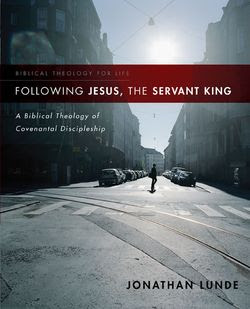"Following Jesus, The Servant King" by Jonathan Lunde
Jonathan Lunde. Following Jesus, the Servant King: A Biblical Theology of Covenantal Discipleship (Biblical Theology for Life) . Zondervant, 2010. 312 pgs.
. Zondervant, 2010. 312 pgs.
Introduction
I seem to be reviewing quite a few books on discipleship this month. "The Invitation" by Greg Sidders was the first; a fine simple introduction to the subject. Then came "The Gospel Commission" by Michael Horton; a not so fine book. The more I think about it the less I like it, and not because Horton is a reformed theologian, but because I think he has missed the point.
Now, in comes a third in Jonathan Lunde's addition to the "Biblical Theology for Life" series. So far, the series stands at two volumes; this one, and "The Mission of God's People: A Biblical Theology of the Church's Mission" by Christopher Wright. I have to say that the first book was incredible and the second book, the subject of this review, does not disappoint. I have great hopes for the rest of this series; if they can keep up with this quality it will be well worth owning.
Summary
In Following Jesus Lunde seeks to explore and explain what seems to be a tension between the uncompromising demands Jesus makes of his followers and the unprecedented grace he offers. In so doing, Lunde asks three questions of discipleship: Why? (Why is it important to try to live up to Jesus high demands) What? (What, precisely, are Jesus high demands?) and How? (How can we possibly do this?). He argues that properly answer these questions we must understand them within a covenantal framework. Specifically, the answers are found "in the realities ushered in by the New Covenant." (31)
Obviously the full answers to these questions are extensive, as they make up the entire book. A short version might read something like what follows.
Why: The answer to this question lies in a proper understanding of covenant. All biblical covenants are initiated by God and grounded in grace, but they all also call for an appropriate response. The gracious grounding of these covenants never diminishes the demand for wholehearted obedience. They do, however, ask that this obedience be lived out in faith. When we come to the new covenant, we have an unheard of amount of grace coming in and, rather than allowing us to lesson the demand for righteous obedience, this heightens the need for our response.
What: This may be summarized in saying that we are called to submit to Jesus' reign, obey the law as it reflects the character of God (which is to say even more severely than was originally though; witness the amplification present in the sermon on the mount), and carry out Jesus' mission in the world.
How: Only in the enabling grace of Jesus Christ. To understand this better, Lunde examines how there has always been three parts to enabling a proper response: regular remembrance and reception of the grace of God which enables our response.
Response
I thoroughly enjoyed this book. More importantly, I learned from it. Lunde does an excellent job of keeping the whole of scripture in view as he explores Jesus call to discipleship. The covenantal context in which he places Jesus ministry, and ours, is eye opening and important.
I have always felt the tension between grace and demand in the words of Jesus; I think most protestants (most Christians?) do. I see the costly effects reduced demands of discipleship has but I also the incredible damage done when Christians lose sight of grace. I have read many a book on this subject, including books by Dallas Willard, N.T. Wright, and others, but none of them have satisfied. Lunde, however, has given me new hope. I still have much to think through and I know I disagree with Lunde on some of the particulars, but this book is more than a step in the right direction.
Conclusion
4.5 of 5 Stars. Recommended. Not everyone will find this an easy read. Lunde delves deep into covenantal theology, close readings of various parts of the bible, and a good mixture of theology and practice. However, these are important and needed. The book is worth your time.
This book is published by Zondervan, and is available from your favorite bookseller from Zondervan. It has been provided by the Koinonia Blog for blog review purposes.

Comments